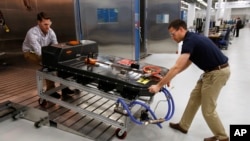Global automakers have touted plans to re-use electric vehicle (EV) batteries when they lose power, but competition for battery packs and cell materials, and the appetite for affordable cars cast doubt on this part of the circular economy.
"The assumption that EV batteries are only going to last eight-to-10 years and then owners will swap them out is just not true," Hans Eric Melin, founder of consultancy Circular Energy Storage (CES), which tracks battery volumes and prices, said. "It's going to be tricky to make second-life work."
While a possible solution for buses, trucks and other commercial vehicles, it will take longer for batteries from passenger cars to be re-used at scale.
The second-life energy storage idea is in theory simple.
As EV batteries' capacity falls below 80%-85% after eight-to-10 years of use, the theory goes, they will be repurposed to power buildings or even balance local and national energy grids.
Demand for used batteries for storage is likely to soar as intermittent renewable energy takes on a bigger role.
By 2030 global battery capacity for grid storage could grow to 680 gigawatt-hours, from 16GWh at the end of 2021, the Paris-based International Energy Agency estimates.
Investors believing in the circular economy, where products and materials are repaired and re-used, have provided around $1 billion in funding to nearly 50 startups globally, according to Reuters calculations.
In addition, carmakers from Mercedes to Nissan have set up their own second-life operations.
The problem is a lack of old EV batteries that shows no sign of easing.
The rising average age of fossil-fuel cars on the road - now a record 12.5 years in the U.S. according to S&P Global Mobility - suggests many EVs will stay on the road for years to come even if their batteries are depleted.
"The 80% threshold is an arbitrary number that does not reflect the real-life usage of EVs," CES' Melin said.
As EVs built a decade ago remain in use, Elmar Zimmerling, business development manager for automotive at German second-life battery startup Fenecon, said there was "as good as no market for second-life batteries" at present, although he predicts a "tsunami" of batteries within the next five years.
Although more energy- and therefore carbon-intensive, recycling also presents another form of competition to re-use as demand for cell materials makes it economically compelling.
"The big question is, if you have pretty valuable raw materials in a battery and you ask 'how can I get the most out of it?' the answer is recycling might be better," said Thomas Becker, head of sustainability at BMW, which has a second-life battery storage facility at its Leipzig plant.
Commercial vehicles provide the best hope thus far for second-life batteries, industry officials said.
London-based startup Zenobe, for instance, teams up with bus companies wanting to go electric. They buy the buses, but Zenobe buys and manages the battery, then takes it for second-life energy storage.
Since 2017, Zenobe has raised around $1.2 billion in debt and equity funding. It owns 435 megawatt-hours of batteries in around 1,000 electric buses in the UK, Australia and New Zealand, which should grow to 3,000 buses by 2025.
Founder Director Steven Meersman said once Britain's 40,000 buses all go electric, they will have 16 gigawatt-hours of batteries on board – about one third of Britain's peak demand in 2022.
"That's a gigafactory on wheels waiting to happen," he said.











Forum